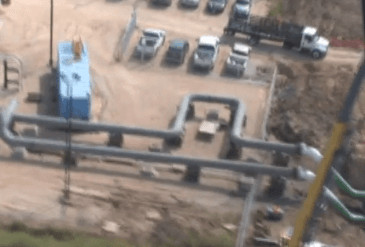Economist discusses jobs lost — or delayed — by denial of Keystone XL pipeline permit
The Obama administration Wednesday rejected a bid to build the Keystone XL pipeline. (Photo from Bloomberg video.)
The Keystone XL pipeline project is dead. Sort of.
When Congress gave President Barack Obama 60 days to approve or reject the permit for TransCanada’s Keystone XL pipeline, Republicans were hoping to get a political victory either way, by forcing Obama to approve the project and claiming credit, or by lambasting Obama for destroying jobs. But Obama was playing his own game of political calculus, hoping to delay the decision on the pipeline until after the November elections, hoping to avoid angering either of two groups of supporters that stand on opposite sides of the issue: environmentalists and labor unions.
Obama warned that with just 60 days, he would not be able to conduct the due diligence he said he needed back in November to approve the permit or identify alternatives. So, on Wednesday, he made good on his promise and blocked the permit, setting off an angry response from Republicans who accused Obama of destroying American jobs.
M. Ray Perryman, an economist and financial analyst and author of “The Impact of Developing the Keystone XL Pipeline Project on Business Activity in the U.S.,” said in a report that the project was going to create tens of thousands of jobs.
“Basically any time you spend billions of dollars on a major infrastructure project, you’re going to create a lot of jobs. We looked very carefully at the procurement, what would be bought inside the United States, outside the United States, what areas would have workers on them, whether there would be work camps or there wouldn’t be work camps, a number of things and went to a great deal of effort to look at the direct spending and how it would take place,” Perryman said.
Then, Perryman’s group applied a multiplier effect for economic activity and came up with the significant number of jobs that Republicans have often cited as the most important reason for approving the project.
“It’s impossible to spend billions of dollars on something and not create economic activity,” he said.
Once it’s built, though, most of those jobs go away. But Perryman said the benefits of having a source of oil from a stable, allied country would be substantial. It reduces uncertainty in the oil market and, also, would have reduced prices modestly, he said.
“Even that is pretty significant when you multiply it and spread it across the entire economy,” Perryman said.
But Obama left the door open for the permit to be approved sometime later. And that’s not sitting so well with the coalition lined up to oppose its construction.
Randy Thompson, a landowner in Nebraska whose who is the face of the anti-pipeline campaign, “Stand with Randy,” said he’s not hearing anyone talking about the jobs that could be lost permanently by farmers and ranchers when the pipeline is built.
“In our country, out here, with our water supply, the water table being so high and the pipeline being submerged directly into our water supply, it definitely presents a threat to our livelihood,” Thompson said. “Once the thing is built, it will be boiling away in our property for the rest of our lives and part of our grandchildren’s lives.
Thompson, a Republican, said he felt like Obama made the only decision he could, in denying the permit.
“Republicans painted him into a corner, because most definitely this project needs to be thoroughly reviewed. The first environmental study was definitely flawed. He was not given time to do the thorough review that needs to be done,” Thompson said. “Not all Republicans are in favor of this project.”
Perryman, though, pointed out that the project has been reviewed environmentally for several years, and much of the work that needed to be done had been done. Though politics certainly became involved.
“Obviously, the 60 day deadline was politically motivated to force the president to choose between his environmental supporters and his labor supporters in a difficult election year,” Obama said.
Perryman said he thinks the project will ultimately be approved, but there may be a slightly different route that will minimize some of the concerns that Thompson raised.
Thomspon, for his part, said that while the issue may have been political at the national level, opposition to the pipeline crosses party lines in Nebraska.
“It’s crossed every line you can think of. Republicans, Democrats, Liberals, Conservatives, urbanites, farmers and ranchers — we have all come together because we realize the threat this pipeline presents to our state,” Thompson said.
We want to hear your feedback so we can keep improving our website, theworld.org. Please fill out this quick survey and let us know your thoughts (your answers will be anonymous). Thanks for your time!
